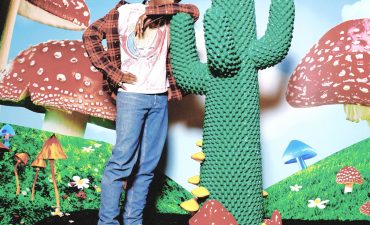The full conversation with Vaney Hariri can be watched in the video player above.
SIOUX FALLS, S.D. (KELO) — Around Sioux Falls, many people know Vaney Hariri, the co-founder of Think 3D Solutions, as a vocal community leader who works frequently with the mayor and law enforcement. Now, anyone watching local television has seen Hariri’s face in Governor Kristi Noem’s latest attack ad on Jamie Smith.
“I was one of the speakers. And so, when I saw this ad, I was taken aback by it. Because, you know, given what actually happened there that day, for those that were involved, in those who participated, it was a beautiful thing,” Hariri told KELOLAND News Thursday afternoon.
The ad, which seeks to paint Smith as “extreme” and a “danger to South Dakota families” features an image of Hariri standing next to Smith on May 31, 2020, at a peaceful march in downtown Sioux Falls. Later that evening, a separate incident took place at the Empire Mall where a group of people rioted. The two events were not connected.
“While crime’s skyrocketing, Smith’s marching with BLM and backing Biden’s open border agenda,” the ad from Noem states.
Both Smith and Hariri say that the Governor is twisting that peaceful event into something it was not.
“The actual protest itself was done very peacefully, and it was very respectful. Again, I shook the hand of every police officer along the way, and it went, it went well. What the kids did later that night, you know, at the mall was wrong. Violence is not right in that situation. And I wasn’t there. And Vaney wasn’t there. That was not what we were at,” Smith said.
Noem’s campaign disagrees.
KELOLAND News reached out to Governor Noem’s re-election campaign with the following questions:
- Is the response you sent to Eric in regard to Vaney’s request to remove the photo the same as what you would say to him in person? What was Governor Noem’s involvement in this response?
- South Dakota News Watch has reported that 79% of South Dakota voters think civility is worsening in the country. From the perspective of the Noem campaign, do you feel that SD politics are worsening? What is the governor seeing/hearing in her travels of the state? If so, what do you attribute to the cause of that?
- Vaney, the constituent in the ad, said the response from you on behalf of the campaign was “toxic.” Jamie Smith expressed a similar sentiment saying “But no constituent deserves this treatment. Governors must respect the people they work for.” Do you agree with their assessment? On the opposite side, do you find the Smith campaign to be using toxic or “uncivil” tactics in their campaigning against the governor?
Ian Fury, the communications director for the Noem campaign, sent the following response:
Jazzmine,
As I said to Eric, it’s a public image that was posted by Jamie Smith’s campaign account. If he has issue with the image being used publicly, then he should take it up with Jamie Smith.
Governor Noem is reminding South Dakotans that Jamie Smith participated in a Black Lives Matter protest that turned into a violent riot, with rocks thrown at cops, shots fired, and small businesses devastated. Jamie Smith posted that photo on social media that same night, AFTER Governor Noem had already deployed the National Guard to restore peace and called a press conference to inform the public on the situation.
Those are the facts, and I trust you will report them.Ian Fury
After seeing the ad, Hariri made a Facebook post denouncing the ad and the use of his image while also contacting the campaign to remove it. The campaign has yet to get back to him.
“I was frustrated by the idea of somebody that I believe really contributes a lot to the community, to have someone of that stature, a leader, you know, haphazardly take a picture like that, and make it feel so nefarious and so negative, was frustrating for me,” Hariri said.
In the back and forth between KELOLAND News, Noem’s campaign and Hariri, the latter expressed disappointment at the responses coming from Noem’s campaign but also at her general campaign tactics for re-election calling them “toxic.”
Hariri is not alone in thinking that civility in politics is worsening.
A South Dakota News Watch poll found that of 500 registered voters, 79% believe that civility has gotten worse in the last five years across the country with 16.4% saying it’s stayed the same and 2.6% saying it’s improved in that time.
Hariri agrees with the 79% that civility is worsening but…
“You know, it’s worsening but I would say that it’s worsening because much of that 79% isn’t actively making it better,” Hariri said. “What we don’t ask the question of: Of all the people who think that it’s worsening, how many of those people still participate? How many of those people still go online and say, ‘You’re this, you’re that,’ or ‘Because you think this, you’re also this.’ How many people do that?”
Michael Card, an emeritus professor of public policy and management at the University of South Dakota, said ads like the ones being used by both candidates are not used to prompt a thoughtful response, but an emotional one.
“But, you know, with our short attention spans, and the nature of certain media, whether it be Twitter, whether it be television, whether it be any media, even including radio, we don’t get the full story. We get a short snippet that is generally very pointed. That doesn’t give any context or explain any nuances in the puzzle,” Card said.
While the ad prompted Hariri to open a public discussion through his post on the current election cycle, he says it goes beyond one TV spot. Now, he wants to call constituents to stand up and hold candidates and politicians accountable by putting an end to these kinds of campaign tactics.
“The whole concept of it is just gross, right? We want to be choosing between the best of the best, not the lesser of two evils,” Hariri said. “I don’t want you to tell me what’s wrong with the other person. I want you to tell me what’s good about you. I want you to tell me what you’re actually going to do for this community.”
South Dakotans don’t like negative campaigns
Negative campaigning is, of course, not new. Especially in South Dakota politics.
In 2002 when Mike Rounds was running for governor, his primary opponents, Mark Barnett and Steve Kirby, were running contentious campaigns attacking each other.
“And what happened was, is over the months leading up to the primary, the ads that Barnett and Kirby were purchasing were increasingly negative and personal while Rounds basically stayed out of that fray. To some extent, the thought was that he wasn’t worth fighting,” Card said.
Card said at the time, he would often take his children for breakfast at local cafes and the “coffee talk” around the primary provided a unique insight to how voters were feeling about the increasingly negative race.
Find the latest election coverage at Your Local Election Headquarters
“About the middle of May, I started to hear things like, ‘I don’t know who this Rounds guy is, but I’m not going to vote for one of these other guys’. And Rounds ended up with getting 44 or so percent of the vote, whereas Mark Burnett got just under 30. And Steve Kirby got just over 25. And Mike Rounds became the Republican candidate,” Card said.
Rounds then went on to secure the governor’s office in the general election.
“You know, in terms of political culture, South Dakota is a very tight culture, deviation from norms is generally or has been generally punished by the voters,” Card said.
Noem herself is not a stranger to a negative campaign either. In 2018 when running against Democrat Billie Sutton, the two engaged in attack ads and fliers against one another.
The current gubernatorial campaign is no different with both candidates launching ads that attack their opponent.
“And so we’re seeing that for the most part, the Republican Party operatives are focusing on the topic of inflation and casting Democratic candidates as being Stooges, so to speak, or affiliated with President Biden. And that’s a typical thing to do is you pick the biggest problem that people are facing, especially if it’s of the opposite party, and you can attach it to the opposite party,” Card said.
But what’s different than 20 years ago is South Dakotans access to media in a wide range of platforms.
“Facebook, Twitter. I’m not a big Instagram user, but it’s on almost every social media platform that we have. And people are putting forward their message,” Card said.
Card added it doesn’t mean a meaningful conversation is happening.
“Well, I think the phrase that you used was tweeting at, it’s not a conversation. It’s, I’m going to get my point out,” Card said. “So, this isn’t a conversation or a dialogue; it’s really a conflict. And it’s setting up for a conflict.”
Social media is also famous for creating “echo chambers” where people are insulated by similar beliefs and viewpoints that they hold and not always seeing other sides to issues.
“Yesterday was the anniversary of Theodore Roosevelt’s Man in the Arena speech where he talked about what is responsible citizenship, and it really is doing our day-to-day duties. And one of those duties is looking for information that might disconfirm our previously held beliefs. That’s hard to do. But that is one of the responsibilities that we have as a citizen in a republic,” Card said.
A conversation at odds
Twitter especially has provided South Dakota voters with a place to interact directly with their elected officials whether to praise their work or disparage it. And the elected officials are responding.
“And we also don’t know who’s actually responding. We don’t know if it’s the governor or Jamie Smith, and we don’t know if it’s their social media person who’s responding. And we don’t know if that’s the official position; we just know that it’s out under their name,” Card said. “And the creation of conflict, again, rewards the base, because the conflict raises our emotional response. And we tend to have an emotional response, as opposed to a thoughtful response.”
In his interactions with the Noem campaign, Hariri said he felt as if he was being made the enemy because they perceived him to not think or vote the way they might want.
“And I just don’t think that is how we should do it. I mean, in a community, when you elect a leader, you get to pick the direction, no doubt about it, but you still govern for everyone,” Hariri said.
Hariri wants to make it clear that this isn’t just about Governor Noem but rather all politicians that use these kinds of tactics to campaign.
“There’s other political figures, from whatever political party, that participate in this kind of politics. And I think we all need to say, ‘We’ve had enough of this. We want to hear about… We want to hear actual facts. We want to hear about actual issues; we want to hear about how you’re going to do things that are going to help us and what you expect from us,’” Hariri said.
Jazzmine Jackson: As a constituent, do you feel comfortable– Do you feel respected as a constituent being talked to in that way on behalf of a gubernatorial campaign?
Hariri: No, not at all.
Hariri went on to say that his feelings would be the same if Smith were to be elected governor and release an ad that targeted a constituent.
“He would get a call from me,” Hariri said.
Hariri wants South Dakotans, regardless of their political beliefs or values, to show that they are not okay with these kinds of campaign tactics.
“Really what I’m just trying to encourage people to do is that when you see that, say something,” Hariri said. “Say, ‘No, we’re not into this.’”
More than a week after the ad aired and Hariri made his post, he says he still stands by his decision to attend the May 31 peaceful march in 2020.
“And so no, I’m not ashamed of that. I’m proud of that. I’m proud of being out there and I’m proud that I was standing next to a leader that wanted to be with people instead of just calling the National Guard but rather actually be there and engage with us,” Hariri said.
Source link


